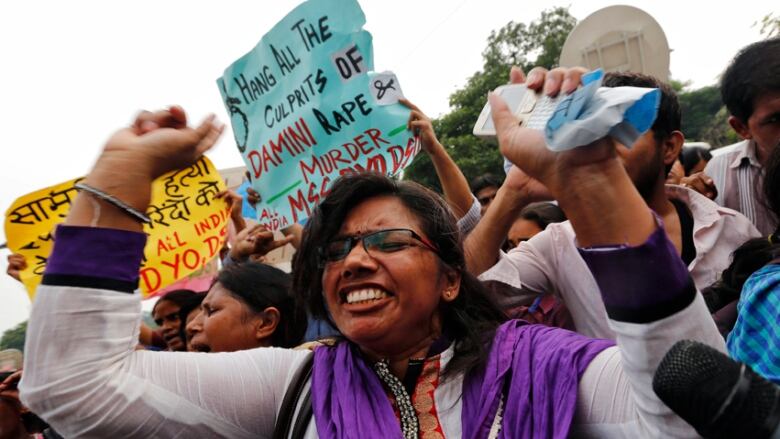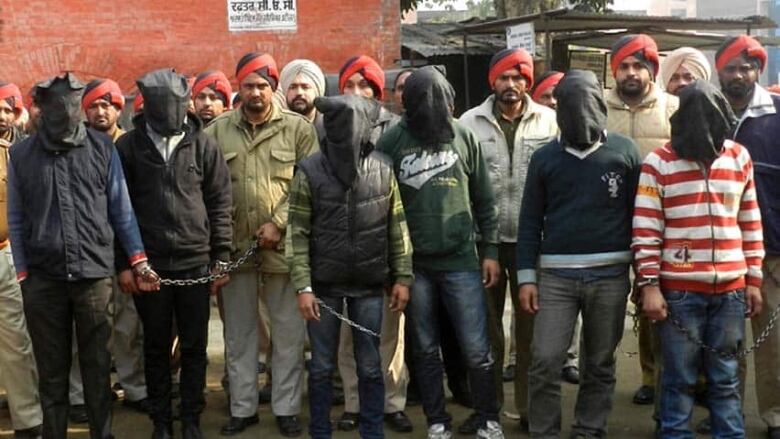Will India gang-rape death sentences change anything?
Four men sentenced to death in December rape and killing of university student

Death to all was the short and swift judgment handed down on Friday to the men convicted in the infamous Delhi gang-rape case.
In his verdict, Judge Yogesh Khanna said that with crimes against Indian women on the rise, the court could not turn a blind eye to the gruesomeness of this case.Khanna added that the death penalty which the Supreme Court says is reserved for only the rarest cases was a fitting punishment for this crime.
Outside the courthouse, the family of the victim told reporters theyre pleased with the verdict and say that justice has been done. But justice is still a far-off hope when it comes to most other rapes in the country.
Since the gang rape and death of a 23-year-old university student in Delhi last December, people from all classes have been wondering how to address what critics call Indias ingrained misogyny.
I recently went to the Centre for Social Research, a womens rights and advocacy group in Delhi, where its director, Ranjana Kumari, told me about a rape victim who had come to see her only a few hours before my visit.
The woman said she was attacked in her home by a repairman while her husband was out. Police quickly caught the man after the incident was reported. But it didnt exactly lead to justice.
In front of the husband, officers made the suspect pull his ears and crouch down with his head between his knees an old-school Indian custom for punishing children before turning to the husband and assuring him the incident had been handled.
Can you believe it? Kumari asked, half-rhetorically, about the incident.

That phrase captures the feeling of people in Delhi since the December attack.
That gruesome assault led to days of protests around the country, particularly in the capital. Officials underestimated public outrage, and the size of crowds, which for days took to the streets to demand social change.
In response, the government enacted new laws, established faster courts dedicated to rape cases and promised to financially care for victims, if only in an attempt to extinguish the outcry.
They rape you with their eyes
But if you ask women in Delhi, it has done nothing to change the culture of masculine aggression.
They rape you with their eyes, a twentysomething Delhi woman told me. Its a phrase I hear again and again from women in the city.
Go to any tourist site, even the holy ones, and you will witness the unadulterated gaze of local men following young, attractive women, foreigners especially. An Indian woman in jeans and a shirt will draw unwanted attention, and even traditional clothing fails to act as a shield against stares and sometimes roaming hands.
When asked to explain this behaviour, average Indians will say that these men are uneducated or backwards. But one only has to look at the statements made by Indias political class to see how entrenched these misogynistic attitudes are.
Who among us has not followed girls? is the now-infamous quote uttered in Indias parliament earlier this year by MP Sharad Yadav.
If a Canadian MP said this in the House of Commons, he could expect those words to be his last as a politician. But in India, Yadav claims to be speaking on behalf of his constituents.
His remark was a reaction to the proposal of a new set of laws meant to protect women specifically one that would make people charged with stalking ineligible for bail.
[Indian] MPs represent the people like this, Kumari tells me, with a mix of frustration and reluctant acceptance.
Yadavs remark stands apart because it was said in parliament, but similar comments are made across Indias political, social and religious power bases.
Rape the result of western influences
After Yadavs declaration, the most infamous quotes on this topic are the ones that attribute the culture of rape to western influences.
Mohan Bhagwat, leader of the Hindu nationalist group Rashtriya Swayamsevak Sangh (RSS), claimed that rapes only happen in cities that embrace western ideals. Rural areas, which hold on to Indian traditions, are rape-free, at least according to Bhagwat.

Theres a satirical Facebook post making the rounds that lampoons this sort of thinking. The post, entitled The Top 10 Ways to Avoid Rape in India, takes actual media quotes from village leaders. The suggested anti-rape measures include banning mobile phones for women, forbidding them from wearing jeans and most bizarrely stopping people from eating chow mein noodles.
Even reality television is taking a hit, with one Indian MP pointing the finger at the 10- to 14-year-old boys and girls that dance on American Idol-type TV shows for fostering a culture of promiscuity.
No one in mainstream Indian culture seems ready to consider that men themselves could be at fault, or that a culture that so reveres mothers could have such a blind spot when it comes to the treatment of girls and women.
New laws not enough
While the laws dealing with stalking and sexual assault have been strengthened, few in India believe harsher laws are enough.
People have to want to obey these laws, and critics say that people in India need to undergo a profound change in their hearts and minds.
The goal now is to address the problem through both genders, by empowering women and educating men. Most activists agree that its key to start at a young age, at the school level. The hope is that this will begin a generational shift that in the next 20 to 30 years will result in a general change in the Indian mindset.
Since the attack in December, cases of rapes and gang rapes are still reported daily in the media. Worse yet, theres been no decrease in the violence or severity of the attacks.
This past summer, a female journalist was gang-raped in Mumbai which is considered far safer than Delhi while her male colleague was beaten and tied up. The similarities to the Delhi case from December sent a shudder through many observers here.
But I have noticed a change in the way the topic is handled. When I moved to India in 2009, I would read articles usually a single paragraph long about rapes almost every day. But no one talked about the problem aloud.
Now it has become an open conversation everywhere you go, from an old roadside tea stall to the shiny new Starbucks outlets that have opened up this year. And those news articles describing rapes have become more numerous and detailed.
While no one in Delhi would let female relatives or friends go out alone after sunset, the taboo of talking publicly about rape has at least gone by the wayside.
While she sees the effects of this misogynistic culture in her office every day, Kumari has reason to be hopeful. If nothing else, she says, women have gained more confidence on talking about these issues.
As for Fridays death sentence, Kumari echoes what others have told me today and throughout the trial: The punishment fits the crime.












_(720p).jpg)


 OFFICIAL HD MUSIC VIDEO.jpg)
.jpg)



























































































